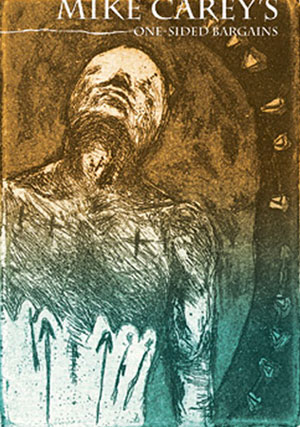Mike Carey's One-Sided Bargains
By Al Kratina
February 5, 2007 - 19:07
Image Comics
Writer(s): Mike Carey
Penciller(s): Mike Perkins, Paul J. Holden, Michael Gaydos
Cover Artist(s): Mike Perkins

Despite what the wholly inaccurate blurb on the back would have you believe,
One-Sided Bargains consists of three, not two, stories from Carey, two illustrated in black and white, and one prose tale with paintings by Michael Gaydos. The first is a version of Germany’s legendary story of Dr. Faustus, updated for more modern audiences. And by updated, I mean cleaned up, streamlined, and condensed, not re-cast with high school students and set in the Southern California drag racing circuit. Carey's
Doctor Faustus is told from the point of view of his assistant, and features the same cold, merciless, but still poetic vision of the ethereal that marks the same writer's
Lucifer. The pencils, by
Captain America's Mike Perkins, are clean, crisp, and classical, and augment the story's cold touch with a clinical, precise feel. While the detached mood and the still-dense narrative might have been distracting in another's hands, with Carey the story never gets dry.
The second story, the brief
Suicide Kings, is not, as the back would suggest, "A Victorian Era Gothic horror story about a little girl lost and the Satanists who choose her as their sacrifice". Instead, it's a story about a bunch of meat-packers playing poker. Tomato, tomahto, I suppose. Anyway, the story is short, but tense, with an ending that's mysterious without being too oblique. Paul J. Holden's pencils are much sloppier and blockier than Perkins', providing a contrast, and giving a more blue-collar feel to the story. It's effective, and has a more visceral impact than
Doctor Faustus, due to its contemporary setting and punchier pacing.
Rating: 8 on 10
Related Articles:
Review: Lucifer #3
Review: Lucifer #19
Lucifer #18
Review: Lucifer #17
Lucifer #16
Review: Lucifer (2015) #15
Review: Lucifer (2015) #14
Review: Lucifer (2015) #13
Review: Lucifer (2015) #12
Review: Lucifer (2015) #11
